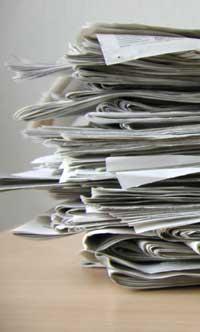Objective fraud
2010/03/18 Carton Virto, Eider - Elhuyar Zientzia
Convinced that the journalist was correctly following the manual of the direct and objective professional, the journalist found guilty a week later by the reader's defender of his diary saying: "Scientific evidence is not a matter of opinion and if you want scientific precision you cannot treat it as if it were the same what is clearly different, nor who has recognized the same degree of authority and who has not."
A clear example of a widespread trend in journalism (and also in society) is what has happened these weeks in El País. The journalist had to write about homeopathy and spoke on equal terms to the voices of both sides in the name of objectivity, to act impartial. And instead of good, a scientific lie arises from a supposed journalistic truth. I also remember another representative anecdote from last year. They called us from a radio to ask for the name of a scientist who defended evolution. In fact, on the radio show they wanted to talk about the theory of evolution since it was Darwin's year and they already had a creationist, but not an evolutionist.
The plural of the anecdote are not data and it is not objective of this column to surprise the journalist. If we begin to intimidate, then the first thing we should do is at the head of us, that we have also fallen into that trap of objectivity. And it is an impartial meme that makes us feel that we are playing correctly and transparently, just the opposite. Reader defender Pérez Oliva says well in the article published last Sunday: "The article has an overview problem (journalist): in scientific journalism there is no room for intermediate positions between proven and unproven theories."
Another thing will be to try to distinguish proven and unproven theories, and to have the right tools for it. In all cases it is not an easy task and sometimes it will not be possible. The methods established by science to investigate, publish and ensure the correction of results are not empty. And there are many results that have been discarded after publication because they were done wrong or because they did not meet the minimum requirements. But when we talk about homeopathy, theory of evolution, astrology, wristband power balance or reflextherapy, it is essential to be clear who should be the starting point and where is the zero of impartiality. And for this we have to renounce the fraudulent parameters of objectivity and throw them without fear of brothels. Because not all opinions deserve respect, because scientific evidence is not opinions, and because it is not complete information on a topic, by definition, a collection of approaches for and against. It has been a pleasure to read these words in El País to the reader's advocate. Astronomer and disseminator Javier Armentia expressed satisfaction copying these words three times on Sunday in his blog. As a lie repeated a thousand times becomes true but a strong lie, you will let me copy once again.
Published in Berria

Gai honi buruzko eduki gehiago
Elhuyarrek garatutako teknologia






